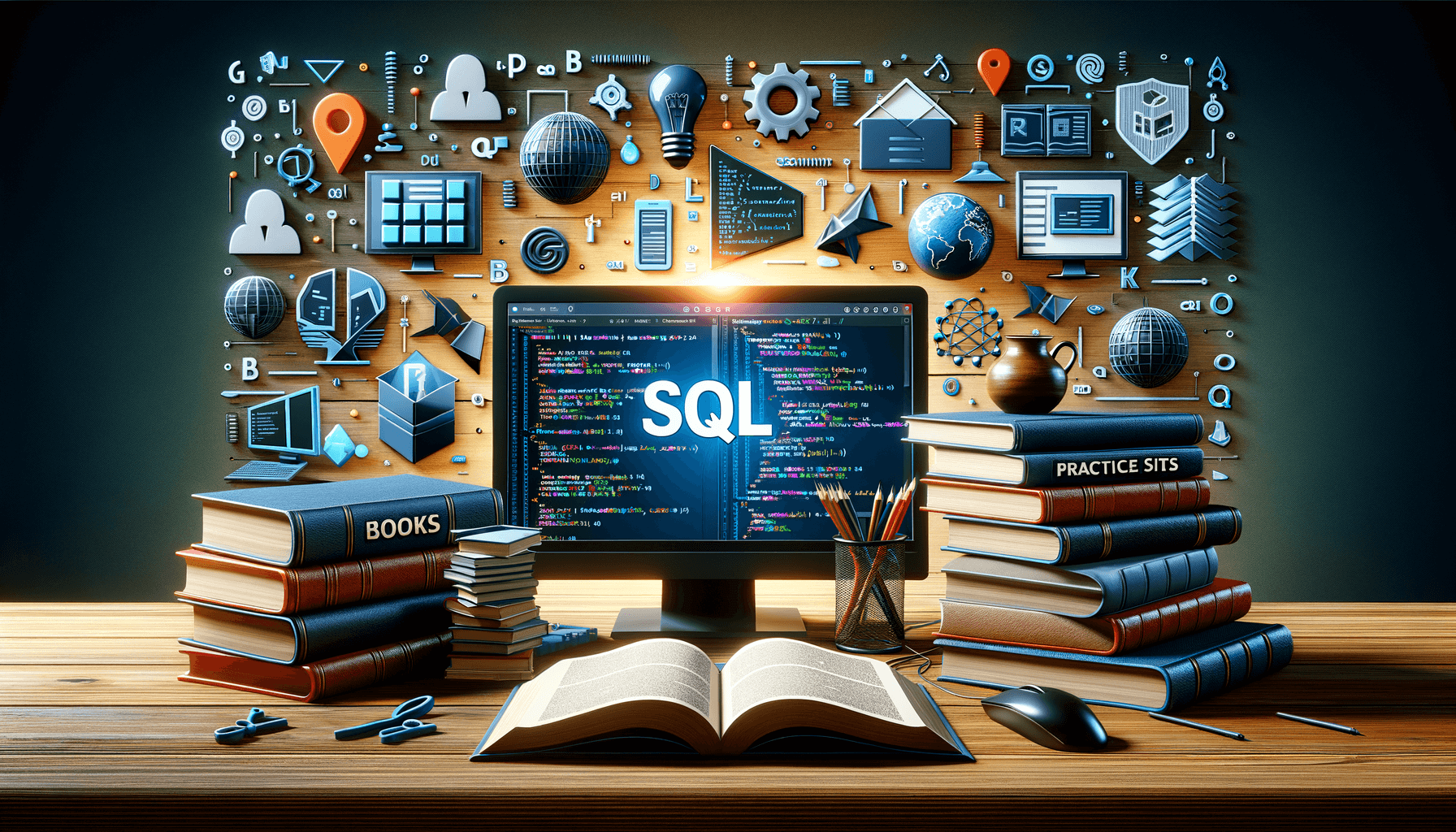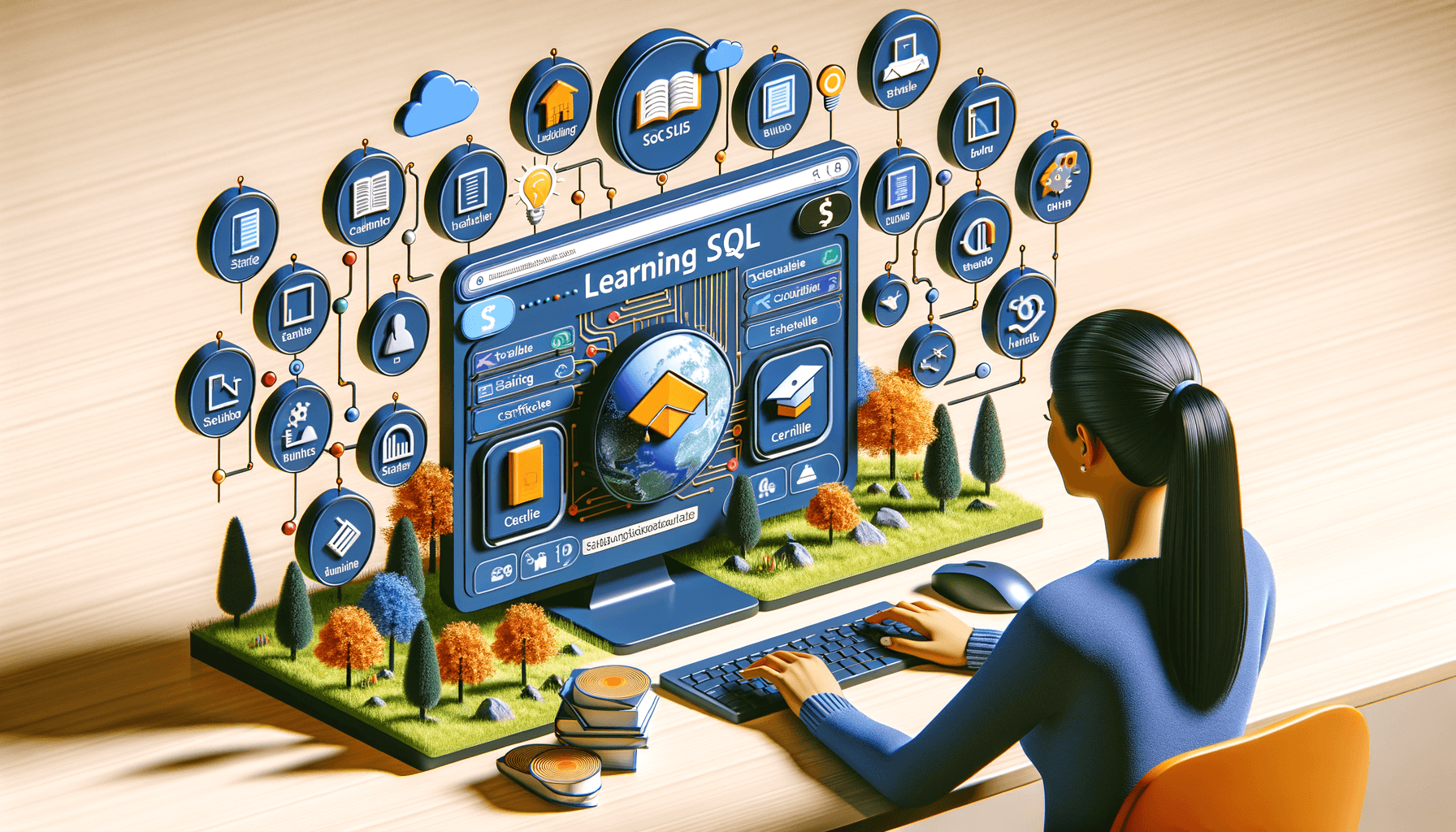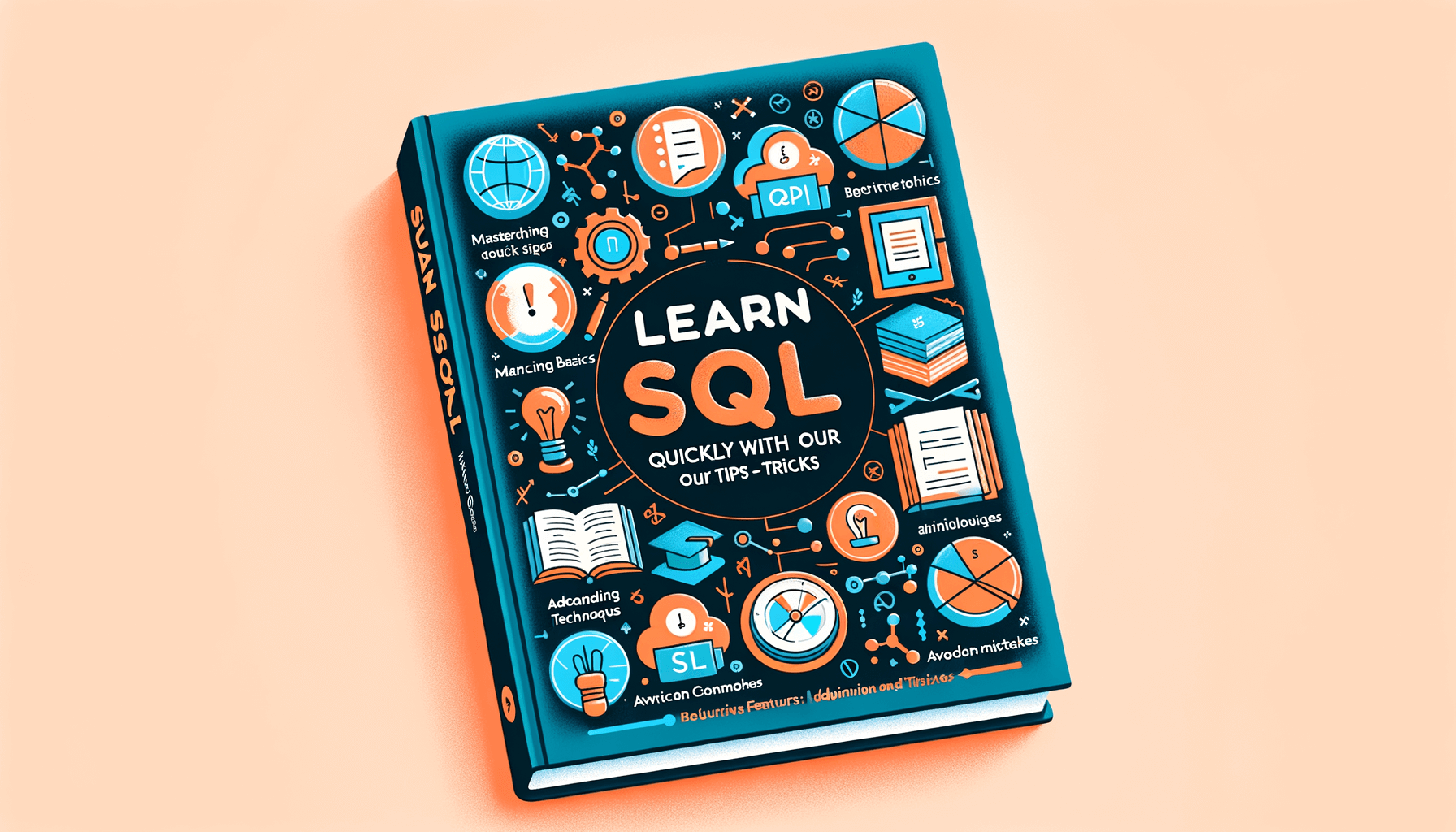A big variety of articles and resources

What resources do you recommend for learning SQL?
 Sia Author and Instructor
Learn SQL
Sia Author and Instructor
Learn SQL
14 minute read
Learning SQL can open many doors, whether you're looking to boost your career or just want to understand databases better. There are many resources out there to help you learn SQL, from books and online courses to practice websites and forums. This article will guide you through some of the best options available.
Key Takeaways
- Books, online courses, and tutorials are great starting points for learning SQL.
- Practice websites and coding platforms offer hands-on experience.
- Official documentation and community guides provide reliable references.
- Forums and discussion boards are useful for getting help and sharing knowledge.
- Webinars, workshops, and certification programs offer advanced learning opportunities.
Books for Mastering SQL
Essential Textbooks
When starting with SQL, it's crucial to have a solid foundation. One of the best textbooks for beginners is "SQL for Dummies". This book breaks down complex concepts into easy-to-understand language. Another great option is "Learning SQL" by Alan Beaulieu, which offers a comprehensive introduction to SQL.
Advanced Reading Materials
For those looking to deepen their knowledge, "SQL Performance Explained" by Markus Winand is a must-read. It dives into the intricacies of SQL performance tuning. Additionally, "SQL Antipatterns" by Bill Karwin helps readers avoid common pitfalls in SQL programming.
Practical Guides
Practical guides are essential for applying what you've learned. "SQL Practice Problems" by Sylvia Moestl Vasilik provides hands-on exercises to test your skills. Another useful resource is "The Art of SQL" by Stephane Faroult, which offers practical advice for writing efficient SQL queries.
A good mix of essential textbooks, advanced reading materials, and practical guides can significantly enhance your SQL learning journey.
Online Courses and Tutorials
Interactive Platforms
Interactive platforms are a great way to learn SQL by doing. Websites like Codecademy and Khan Academy offer hands-on exercises that help you practice as you learn. These platforms make learning fun and engaging. You can also find a blog page on sqlskillz.com with articles, tutorials, and insights on SQL skills.
University Courses
Many universities offer free online courses in SQL. These courses are often part of larger computer science programs and provide a deep understanding of SQL. Websites like Coursera and edX host these courses, making them accessible to everyone. They are perfect for those who want a more structured learning experience.
Video Tutorials
Video tutorials are another excellent resource for learning SQL. Platforms like YouTube and Udemy have countless videos that cover everything from basic queries to advanced database management. Watching videos can be especially helpful for visual learners who benefit from seeing concepts in action.
For those who prefer a mix of learning styles, combining interactive platforms, university courses, and video tutorials can offer a well-rounded education in SQL.
SQL Practice Websites
Hands-On Coding Platforms
For those looking to get their hands dirty with SQL, hands-on coding platforms are a great resource. These platforms provide interactive environments where you can write and execute SQL queries directly in your browser. They offer practical SQL training with real-world problem-solving. This is perfect for those who learn best by doing.
Challenge-Based Learning
Challenge-based learning websites are another excellent way to practice SQL. These sites present you with various SQL challenges that you need to solve. This method helps you think critically and improve your problem-solving skills. It's a fun and engaging way to learn SQL.
Community-Driven Sites
Community-driven sites are platforms where users can share their own SQL problems and solutions. These sites often have forums where you can ask questions and get answers from other SQL learners and experts. They offer a collaborative learning experience that can be very beneficial for mastering SQL.
Mastering PostgreSQL performance and query optimization course offers practical SQL training with real-world problem-solving, hands-on projects, and expert-led instruction for career advancement in data management.
SQL Documentation and References
Official Documentation
For anyone serious about learning SQL, the official documentation is a must-read. It provides comprehensive details on SQL syntax, functions, and best practices. Official documentation is often the most reliable source of information, as it is maintained by the creators of the SQL language.
Community-Contributed Guides
Community-contributed guides are another valuable resource. These guides are written by experienced users who share their knowledge and tips. They often include practical examples and real-world scenarios that can help you understand complex concepts. Websites like sqlskillz.com offer SQL essentials courses for IT students and professionals, where you can gain practical skills through real-world projects and expert-led training.
Reference Manuals
Reference manuals are essential for quick look-ups and in-depth understanding. They provide detailed explanations of SQL commands and functions. Having a good reference manual on hand can save you a lot of time when you're working on SQL projects.
For those who prefer a more hands-on approach, community-contributed guides and reference manuals can be incredibly helpful. They offer insights and tips that you might not find in official documentation.
Highlights
- Official documentation is the most reliable source of information.
- Community-contributed guides offer practical examples and real-world scenarios.
- sqlskillz.com provides SQL essentials courses for IT students and professionals.
- Reference manuals are great for quick look-ups and in-depth understanding.
Forums and Discussion Boards
When seeking help or engaging in discussions about SQL, online forums and discussion boards are valuable resources. These platforms provide a space for interactive conversations, where individuals can ask questions, share insights, and seek advice from a community of SQL enthusiasts. Popular SQL forums offer a wide range of topics, from beginner queries to advanced database management techniques. Expert-led discussions on these platforms can deepen one's understanding of SQL concepts and best practices. Additionally, community support plays a crucial role in fostering a collaborative learning environment for SQL learners. Engaging in these forums can enhance our SQL knowledge and skills, making the learning journey more interactive and engaging.
SQL Blogs and Articles
Industry Expert Blogs
For those looking to stay updated with the latest trends and insights in SQL, industry expert blogs are a fantastic resource. These blogs are often written by seasoned professionals who share their experiences, tips, and best practices. Following these blogs can provide a wealth of knowledge and keep you informed about new developments in the SQL world.
Technical Articles
Technical articles are another valuable resource for learning SQL. These articles often delve into specific topics, providing detailed explanations and examples. They can help you understand complex concepts and apply them in real-world scenarios. Many websites and online publications regularly feature technical articles on SQL, making it easy to find information on a wide range of topics.
Case Studies
Case studies offer a practical perspective on how SQL is used in various industries. They provide real-world examples of SQL applications, showcasing how different organizations solve problems using SQL. Reading case studies can give you a better understanding of how SQL is applied in different contexts and inspire you to think creatively about your own SQL projects.
Exploring SQL blogs and articles can significantly enhance your understanding and keep you updated with the latest trends and best practices in the field.
Webinars and Online Workshops
Live Webinars
Live webinars are a great way to learn SQL in real-time. They often feature experts who share their knowledge and answer questions on the spot. One such resource is Jumpstart SQL, which offers free introductory lessons with hands-on projects, personalized support, and industry insights. Instructor Eric Vanier brings 25 years of expertise in SQL and database management to these sessions.
Recorded Sessions
Recorded sessions allow you to learn at your own pace. These are usually recordings of live webinars or specially made tutorials. They are perfect for those who need flexibility in their learning schedule. You can pause, rewind, and rewatch as needed.
Interactive Workshops
Interactive workshops provide a more hands-on approach to learning SQL. These workshops often include practical exercises and real-world scenarios to help you apply what you've learned. They are usually more intensive and can be a great way to deepen your understanding of SQL.
SQL Certification Programs
Certification Bodies
When it comes to SQL certifications, several well-known organizations offer programs that can help validate your skills. Microsoft, for instance, provides certifications like the Microsoft Certified: Azure Data Scientist Associate. Similarly, Oracle offers the Oracle Database SQL Certified Associate. These certifications are recognized globally and can significantly boost your career prospects.
Preparation Resources
Preparing for SQL certification exams requires a mix of theoretical knowledge and practical experience. We recommend using official study guides provided by the certification bodies. Additionally, online platforms like Coursera and Udemy offer specialized courses tailored to these exams. Practice tests are also invaluable for getting a feel of the actual exam environment.
Exam Strategies
To excel in SQL certification exams, it's crucial to have a well-structured study plan. Focus on understanding the core concepts and practicing as much as possible. Time management is another key factor; make sure to allocate specific time slots for each topic. Lastly, don't underestimate the importance of mock exams to gauge your readiness and identify areas that need improvement.
SQL Cheat Sheets and Quick References
Printable Cheat Sheets
Printable cheat sheets are a great way to have quick access to essential SQL commands and syntax. They often include common queries, functions, and operators, making them handy for both beginners and experienced users. Having a cheat sheet on hand can save time and help avoid common mistakes.
Online Quick References
Online quick references provide a convenient way to look up SQL commands and syntax on the go. These resources are often updated with the latest information and can be accessed from any device with an internet connection. They are particularly useful for those who prefer digital resources over printed materials.
Command Summaries
Command summaries offer a concise overview of SQL commands and their usage. These summaries can be found in various formats, including tables and lists, making it easy to find the information you need quickly. Using command summaries can help reinforce your understanding of SQL and improve your coding efficiency.
Quick references and cheat sheets are invaluable tools for anyone learning or working with SQL. They provide a fast and easy way to access important information, helping to streamline the learning process and improve productivity.
GitHub Repositories for SQL
Open Source Projects
Exploring open source projects on GitHub can be a great way to learn SQL. These projects often include real-world examples and can help you understand how SQL is used in various applications. Contributing to these projects can also enhance your skills and provide valuable experience.
Sample Databases
GitHub hosts a variety of sample databases that you can use to practice your SQL skills. These databases cover different scenarios and data sets, allowing you to experiment with various SQL queries and techniques. Using these resources can be particularly helpful for those enrolled in a data analyst - introduction to SQL course.
Learning Repositories
There are numerous learning repositories on GitHub that offer structured SQL lessons and exercises. These repositories are often created by experienced developers and educators, providing a wealth of knowledge and practical exercises. Engaging with these resources can help you build a strong foundation in SQL and prepare you for more advanced topics.
Podcasts and Audio Resources
SQL-Focused Podcasts
Podcasts are a great way to learn SQL while multitasking. They offer insights from industry experts and cover a wide range of topics, from basic SQL commands to advanced database management techniques. Some popular SQL-focused podcasts include 'SQL Data Partners' and 'SQL Server Radio'. These podcasts often feature interviews with professionals who share their experiences and tips.
Technical Discussions
For those who enjoy deep dives into technical subjects, there are podcasts that focus on the nitty-gritty details of SQL. These discussions can help you understand complex concepts and stay updated with the latest trends in the SQL world. Podcasts like 'Data Skeptic' and 'Talking Data' are excellent resources for this purpose.
Expert Interviews
Listening to interviews with SQL experts can provide valuable insights and inspiration. These interviews often cover career advice, best practices, and real-world applications of SQL. Podcasts such as 'Data Engineering Podcast' and 'The SQL Server Show' frequently feature expert interviews that can help you learn from the best in the field.
Podcasts are a flexible learning tool, allowing you to gain knowledge while on the go. Whether you're commuting, exercising, or doing household chores, you can always find time to learn something new about SQL.
SQL Conferences and Meetups
Annual Conferences
Attending annual SQL conferences is a great way to stay updated with the latest trends and technologies in the SQL world. These events often feature expert-led discussions and workshops that can help deepen your understanding of SQL. Some popular conferences include SQLBits, PASS Data Community Summit, and Data Platform Summit.
Local Meetups
Local meetups provide a more intimate setting for SQL enthusiasts to connect and share knowledge. These gatherings are often organized by community members and can be a great way to get hands-on experience with SQL. You can find local meetups through platforms like Meetup.com or local tech groups.
Networking Opportunities
Networking at SQL events can open doors to new opportunities and collaborations. Whether you're attending a large conference or a small meetup, the chance to meet like-minded individuals and industry experts is invaluable. Don't miss out on the networking opportunities these events offer, as they can lead to new projects, job offers, and valuable friendships.
Participating in SQL conferences and meetups can significantly enhance your skills and broaden your professional network. These events offer a unique blend of learning and networking that is hard to find elsewhere.
Are you passionate about SQL and eager to connect with like-minded individuals? Join us at upcoming SQL conferences and meetups! These events are perfect for networking, learning, and sharing knowledge. Don't miss out on the opportunity to grow your skills and meet industry experts. Visit our website to find out more and sign up today!
Conclusion
Learning SQL is a valuable skill that can open many doors in the tech world. Whether you are a beginner or looking to improve your skills, there are many resources available to help you. From online courses and tutorials to books and community forums, you can find the right tools to fit your learning style. Remember to practice regularly and apply what you learn to real-world problems. With dedication and the right resources, you can become proficient in SQL and use it to solve complex data challenges.
Frequently Asked Questions
What are some good books to learn SQL?
There are many great books to start learning SQL. Some of the essential ones include 'SQL for Dummies' for beginners and 'SQL in 10 Minutes, Sams Teach Yourself.' For more advanced readers, 'SQL Performance Explained' is a good choice.
Where can I find online courses for SQL?
You can find many online courses on platforms like Coursera, Udemy, and Khan Academy. These platforms offer both beginner and advanced courses.
Are there any websites to practice SQL?
Yes, websites like LeetCode, HackerRank, and SQLZoo offer hands-on coding platforms where you can practice SQL queries.
What is the best way to get SQL documentation?
The best way to get SQL documentation is through the official documentation provided by database vendors like Oracle, Microsoft, and MySQL. You can also find community-contributed guides online.
Can I join any forums to discuss SQL?
Yes, there are many forums where you can discuss SQL. Some popular ones include Stack Overflow, SQLServerCentral, and Reddit's r/SQL.
Are there any good blogs about SQL?
Yes, there are many good blogs about SQL. Some of them are written by industry experts and cover a wide range of topics. Examples include 'SQL Authority' and 'Brent Ozar's Blog.'
What are some resources for SQL certification?
For SQL certification, you can look into certification bodies like Microsoft, Oracle, and IBM. They provide preparation resources and exam strategies to help you pass the certification exams.
Where can I find SQL cheat sheets?
You can find SQL cheat sheets online. Websites like SQLCheatSheet.com and GitHub offer printable cheat sheets and quick reference guides.
Related Articles

Can I learn SQL fast enough to get a job next week using it?
12 minute read

Discover the Best Website to Learn SQL in 2023
9 minute read





